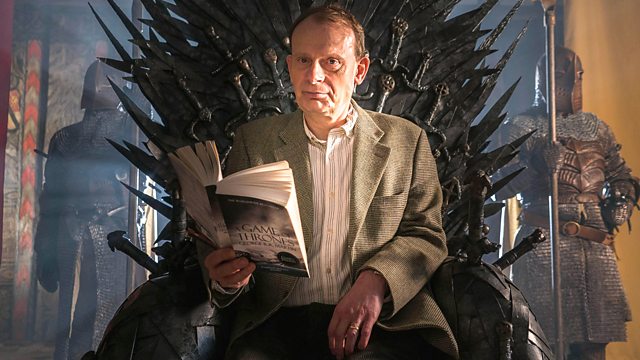Fantasy
Series in which Andrew Marr explores the books we read. He argues that fantasy novels are filled with big ideas that allow us to see our own world in a surprising way.
What is it about stories of magic, epic adventure, and imaginary worlds that has turned fantasy fiction into one of the world's most popular forms of storytelling, regularly filling the bestseller lists and entrancing adults and children alike?
In the second episode of his series that deconstructs the books we (really) read, Andrew Marr argues that these stories are filled with big ideas. Yes, there may be wizards with pointy hats as well as the odd dragon, but what fantasy novels are really good at is allowing us to see our own world in a surprising way, albeit through a twisted gothic filter.
The current leading exponent of fantasy fiction is a bearded Texan, George RR Martin, whose A Game of Thrones began a bookshelf-buckling series of novels, and spawned a vast TV empire. But Andrew reminds us that this is a genre whose origins are British, and at its heart is still a quest to reconnect readers with the ancient ideas and folk beliefs of the world before the Enlightenment.
Andrew breaks down fantasy books into a set of conventions that govern the modern genre - he looks at the intricacy with which imaginary worlds are built (as seen in George RR Martin's A Song of Ice and Fire series), the use of portals that are able to bridge this world and another (most famously, the wardrobe in CS Lewis's Narnia books), as well the concept of 'thinning' - these novels are typically set in a world in decline. In fantasy fiction, winter is always coming.
To help him understand these books, Andrew meets bestselling fantasy writers and the programme includes interviews with Neil Gaiman, Alan Garner and Frances Hardinge.
As well as profiling key figures such as CS Lewis and Sir Terry Pratchett, Andrew considers the spell that medieval Oxford has cast on generations of authors from Lewis Carroll to Philip Pullman. And he gets to grips with the legacy of JRR Tolkien, a figure so important that his influence pops up everywhere 'like Mount Fuji in Japanese prints', according to Pratchett. Tolkien's predominance would not go unchallenged, and Andrew shows how writers like Ursula K Le Guin confronted Tolkien's rather European notions of what an imaginary world should be.
Last on
More episodes
Previous
Next
See all episodes from Sleuths, Spies & Sorcerers: Andrew Marr's Paperback Heroes
![]()
#LovetoRead
Features and programmes for the campaign celebrating the pleasures of reading
Clip
-
![]()
Neil Gaiman reads from American Gods
Duration: 01:04
Music Played
Timings (where shown) are from the start of the programme in hours and minutes
-
![]() 00:05
00:05Ramin Djawadi
Game of Thrones - Main Title
-
![]() 00:21
00:21Max Richter
Shadow Journal
-
![]() 00:44
00:44Nick Cave & Warren Ellis
Song for Jesse
Credits
| Role | Contributor |
|---|---|
| Presenter | Andrew Marr |
| Series Producer | Sebastian Barfield |
| Director | Andy Hall |
| Producer | Andy Hall |
| Executive Producer | Michael Poole |
| Participant | Neil Gaiman |
| Participant | Frances Hardinge |
| Participant | Alan Garner |
| Participant | Joe Abercrombie |
Broadcasts
- Mon 24 Oct 2016 21:00
- Tue 25 Oct 2016 02:50
- Wed 26 Oct 2016 23:00
- Wed 15 Nov 2017 23:00
- Wed 14 Nov 2018 23:30
- Tue 19 Nov 2019 23:10
- Fri 22 May 2020 00:50
- Wed 10 Jul 2024 21:00
- Fri 12 Jul 2024 02:15
Featured in...
![]()
Sleuths, Spies & Sorcerers
Andrew Marr deconstructs detective fiction, fantasy epics and spy novels
![]()
Andrew Marr's Paperback Heroes
Andrew Marr explores detective fiction, fantasy epics and spy novels.
Learn how to write fiction and test your creativity with The Open University
What fictional plots, characters and worlds can you create?
Cover stories: Sleuths, spies, sorcerers and other paperback heroes
A selection of enticing cover art drawn from best-selling paperbacks of genre fiction.







